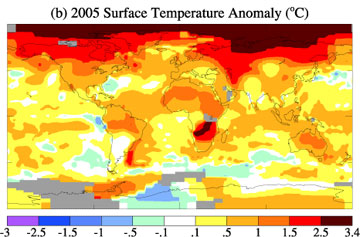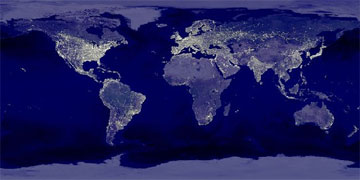United States acting unethically on global warming says new report
United States acting unethically on global warming says new report
mongabay.com
November 8, 2006
For all the lip service the U.S. government gives to “values”, a new paper raises some troubling ethical questions on its global warming stance
A new paper argues that ethics, human rights, and justice should be key components to international negotiations on global warming. It says that some countries, notably the United States, are currently taking positions that are “ethically problematic” and may violate basic human rights of people living in other countries.
Released at the United Nations Climate Change Conference meeting in Nairobi, Kenya, The “White Paper on the Ethical Dimensions of Climate Change” says that “nations that use scientific uncertainty, cost to their national economy alone, lack of action by other nations, or waiting for new, less costly technologies to be invented as justifications for not reducing their emissions to a level that represents its fair share of safe total global emissions, are acting unethically,” according to a news release from the Collaborative Program on the Ethical Dimensions of Climate Change.
Climate change, largely fueled by pollution from the world’s wealthiest countries, is expected to disproportionately impact the world’s poorest countries, where drought and natural disasters already conspire to cause widespread suffering and poverty. Recent climate models show that mean surface temperatures in Africa may climb by 2-6 degrees C by 2100 with a corresponding drop in precipitation. The U.N. says that by 2025 some 480 million Africans could be living in water scarce or water stressed areas. Meanwhile climate change could create moderate agricultural benefits in some parts of the United States, Canada, and northern Europe. The great irony is that while Africa has the world’s lowest levels of greenhouse gas emissions, contributing the least to global climate change, it has been forced to bear the brunt of the phenomenon.
The new report argues that wealthy countries responsible for bulk of the increase in atmospheric greenhouse gas levels have on ethical responsibility to the rest of the world to address the problem.
|
|
“Climate change policies developed by nations that result in harm to life, liberty, and securities of people in other nations violate basic human rights,” said the paper. “The world community must refuse giving credence to these arguments as a matter of justice and ethics.”
The paper states that “ethical principles require that all nations must:
- Immediately acknowledge that they have an ethical duty to reduce their emissions as quickly as possible to their fair share of safe total global emissions;
- Immediately agree that an international greenhouse gas (GHG) atmospheric stabilization target should be as low as now possible unless those who are most vulnerable to climate change impacts have consented to be put at risk from higher atmospheric concentrations of GHGs;
- No longer use scientific uncertainty as a justification for refusing to reduce emissions to their fair share of safe global emissions;
- No longer use cost to their national economy alone as justification for their willingness to reduce emissions to their fair share of safe global emissions;
- No longer act as if they are just in refusing to act to reduce their emissions to their fair share of global emission on the basis that all other nations have yet to reduce their emissions;
- No longer refuse to reduce emissions on the basis that new less costly technologies will be invented in the future;
- Agree that all nations need to come up with positions on allocating greenhouse gas targets among nations that are based upon ethically relevant criteria;
- Consider and consult with other nations and peoples who will be most adversely affected by climate change in setting national climate change policies;
- Acknowledge that climate change policies that do not consider the ethical dimensions of climate change could lead to violations of human rights and unjust distribution of harms and benefits of climate change;
- Admit that those nations who are most responsible for human-induced climate change have responsibility to pay for human-induced caused harms from climate change;
- Support a post-Kyoto round of negotiations that will lead to both adequate reductions to minimize atmospheric concentrations of GHGs and be ethically and equitably supportable.
–reproduced from rockethics.psu.edu/climate
This article quotes extensively from a Penn State news release.
>

